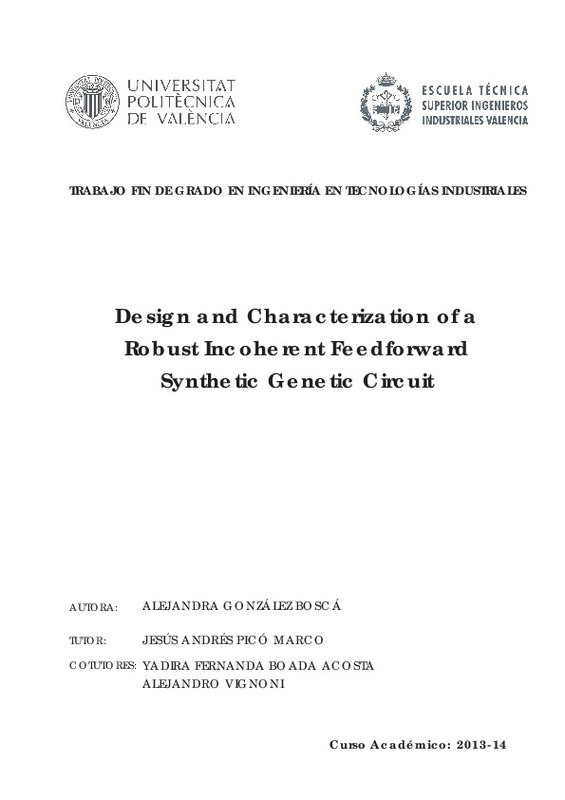JavaScript is disabled for your browser. Some features of this site may not work without it.
Buscar en RiuNet
Listar
Mi cuenta
Estadísticas
Ayuda RiuNet
Admin. UPV
Diseño y caracterización de circuitos genéticos sintéticos robustos
Mostrar el registro sencillo del ítem
Ficheros en el ítem
| dc.contributor.advisor | Picó Marco, Jesús Andrés
|
es_ES |
| dc.contributor.author | González Boscá, Alejandra
|
es_ES |
| dc.date.accessioned | 2015-05-13T11:28:49Z | |
| dc.date.available | 2015-05-13T11:28:49Z | |
| dc.date.created | 2014-07-16 | |
| dc.date.issued | 2015-05-13 | es_ES |
| dc.identifier.uri | http://hdl.handle.net/10251/50148 | |
| dc.description.abstract | [ES] EL TFG se enmarca en la aplicación de metodologías de ingeniería de sistemas y automática a la biología sintética. En concreto, se abordará el diseño de mecanismos de regulación genética (control realimentado) de rutas metabólicas para el reparto óptimo de carga metabólica. El objetivo del sistema de control es mitigar el efecto de las perturbaciones de flujo causadas por cambios de requerimientos celulares o por rutas metabólicas que drenan metabolitos de interés. | es_ES |
| dc.description.abstract | [EN] The goal of this work is to derive design principles for the implementation of robust incoherent feedforward (IFF) synthetic genetic circuits. These class of circuits are ubiquitous in biological gene regulation networks (GRN). They allow the organisms to present adaptive behavior, or adaptation for short. This behavior is generally related to the so-called homeostasis capability in living organisms. Thus, adaptation consists of the circuit capability to respond to an input stimulus and return to its original value even when the input change persists. Notice this aception of adaptation is different from the one appearing in other branches of engineering. The biological adaptive IFF GRN is to some extent an analogous to a positive flank detector in electronics. In synthetic biology, feedforward genetic circuits can be used as pulse generator and response accelerator. Furthermore it is theoretically demonstrated that fold-change detection can be generated by this topology, so we can obtain a response that is proportional to the fold-change in the stimulus relative to the background. Tough the general principles behind the behavior of feedforward gene regulation circuits are already well-known, their actual implementation to achieve the desired performance is still challenging. Studies in the literature either implement a network and analyse the performance a posteriori, or deal with very simplified non realistic computational models. In this thesis a realistic biochemical first principles model is first defined. Then, the model is reduced using both time-scale separation, and existence of invariant moieties. A multi-objective optimization approach is used to obtain the Pareto-optimal solutions in the circuit parameters space that make the circuit to achieve robust adaptation. Monte-Carlo sampling is also used to asses on the degradation of circuit performance outside the Pareto front. Using all this information, design principles are tried to infer in order to be able to offer new tools for the systematic design of genetic synthetic incoherent feedforward circuits with pre-established adaptive response. Next, these sets of optimal model parameters values are compared against the biologically achievable values to check the feasibility of implementation, and tuning rules using biological tuning knobs are proposed. Finally, in order to show the applicability of this work, a biological prototyping has been done. | es_ES |
| dc.language | Español | es_ES |
| dc.publisher | Universitat Politècnica de València | es_ES |
| dc.rights | Reconocimiento (by) | es_ES |
| dc.subject.classification | INGENIERIA DE SISTEMAS Y AUTOMATICA | es_ES |
| dc.subject.other | Grado en Ingeniería en Tecnologías Industriales-Grau en Enginyeria en Tecnologies Industrials | es_ES |
| dc.title | Diseño y caracterización de circuitos genéticos sintéticos robustos | es_ES |
| dc.type | Proyecto/Trabajo fin de carrera/grado | es_ES |
| dc.rights.accessRights | Abierto | es_ES |
| dc.contributor.affiliation | Universitat Politècnica de València. Escuela Técnica Superior de Ingenieros Industriales - Escola Tècnica Superior d'Enginyers Industrials | es_ES |
| dc.contributor.affiliation | Universitat Politècnica de València. Departamento de Ingeniería de Sistemas y Automática - Departament d'Enginyeria de Sistemes i Automàtica | es_ES |
| dc.description.bibliographicCitation | González Boscá, A. (2014). Diseño y caracterización de circuitos genéticos sintéticos robustos. http://hdl.handle.net/10251/50148. | es_ES |
| dc.description.accrualMethod | TFGM | es_ES |
| dc.relation.pasarela | TFGM\12301 | es_ES |
Este ítem aparece en la(s) siguiente(s) colección(ones)
-
ETSII - Trabajos académicos [9862]
Escuela Técnica Superior de Ingenieros Industriales






